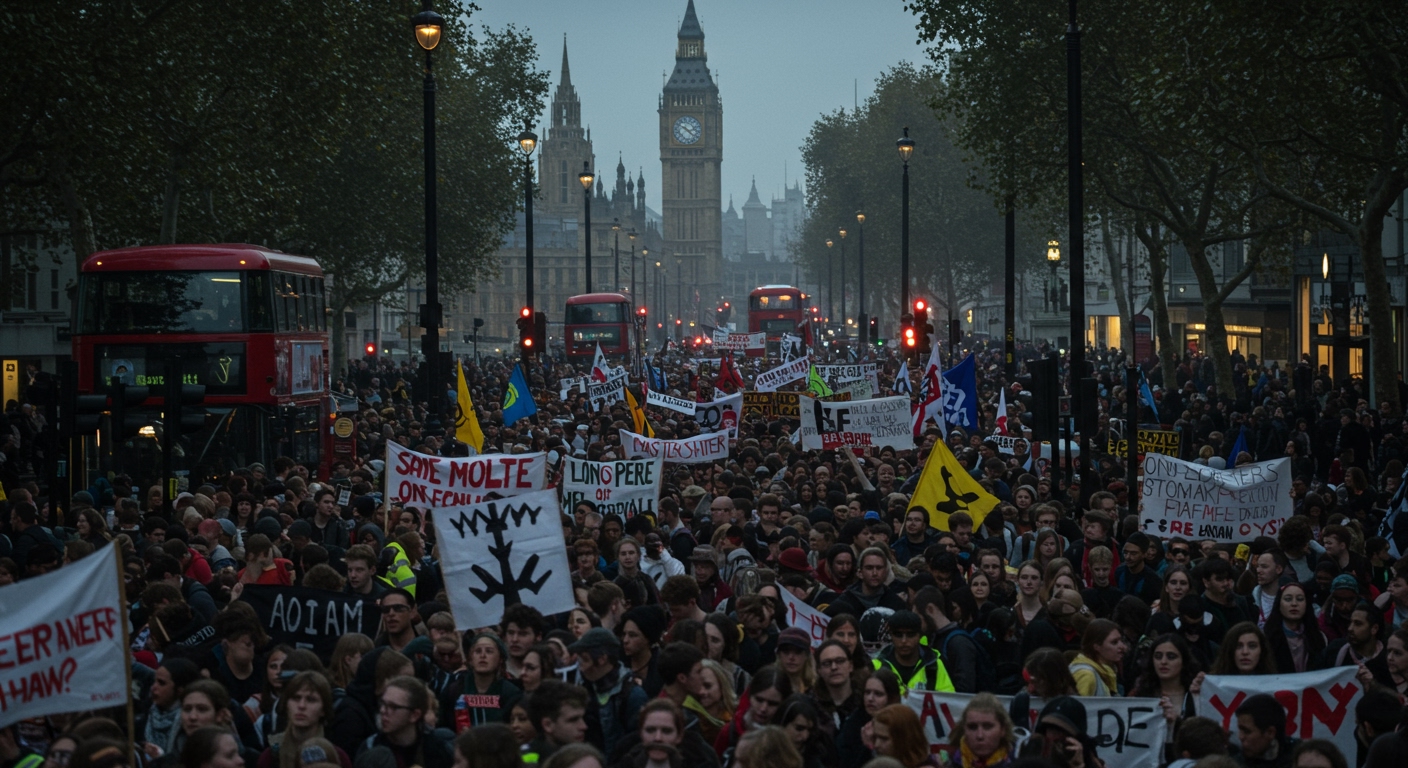LONDON – Hundreds of protesters gathered in central London on Wednesday, July 2, 2025, to voice vehement opposition to a proposed ban targeting the activist group Palestine Action. The demonstration was a direct response to recent moves by the United Kingdom government signalling its intent to proscribe the organisation.
The proposed ban has ignited a fierce debate over civil liberties and the parameters of political protest in the UK, particularly concerning activism related to the Israeli-Palestinian conflict. Demonstrators converged on the capital, holding banners and chanting slogans critical of the government’s stance.
Voices of Opposition on the Streets
The atmosphere was charged as protesters articulated their reasons for opposing the ban. A central theme among many participants was the assertion that a ban on Palestine Action would suppress legitimate opposition to perceived injustices. According to a protester cited from the demonstration, the proposed ban is occurring within a context where they believe “a genocide is occurring.” This protester referenced the recent decision by the International Criminal Court (ICC) to issue warrants against the leader of Israel and the former defence minister of Israel, linking these international legal developments to their concerns about the ongoing situation.
Demonstrators argued that targeting Palestine Action would be a severe blow to freedom of expression and the right to protest against what they view as significant human rights violations. The sentiment expressed by many was that rather than silencing dissent, a ban would likely have the opposite effect on the movement’s supporters.
Protesters’ Stance on the Ban’s Impact
A recurring point raised by participants was the conviction that outlawing Palestine Action would not diminish the resolve of its sympathisers. Protesters emphatically stated their belief that a ban would, in fact, make those who support the group and its cause “stronger, more determined, and angrier.” This perspective suggests that the proposed governmental action is perceived not as a deterrent but as a provocation that could galvanise further resistance.
The proposed proscription is seen by protesters as a fundamental attack on the fundamental right to freedom of speech. They argue that standing against what they describe as genocide is a moral imperative, and any attempt to criminalise a group dedicated to this opposition constitutes an unacceptable infringement on democratic freedoms and the right to peaceful assembly and protest.
The Government’s Position (Context based on source)
While the protest focused squarely on opposing the ban, the government’s specific grounds for considering the proscription of Palestine Action were not detailed in the information provided from the protest itself. However, government moves to ban groups typically involve assessments related to national security, public order, or the alleged encouragement of illegal activities. Proscribing an organisation under UK law makes it a criminal offence to belong to, support, or display support for the group.
The government’s intention to potentially ban Palestine Action follows scrutiny of the group’s direct action tactics, which have often involved targeting companies with alleged links to the Israeli defence industry through acts of vandalism and trespass. These actions have led to numerous arrests and court cases, sparking debate over whether such tactics constitute legitimate protest or criminal activity. The proposed ban elevates this debate to a new level, suggesting a governmental view that the group’s activities may cross the threshold for proscription.
Implications for Protest and Dissent
The protest on July 2 highlights the deep divisions surrounding the Israeli-Palestinian conflict within the UK and the increasing tension between state authority and activist groups employing disruptive tactics. Protesters view the potential ban as part of a broader trend of curbing dissent and limiting the scope of acceptable protest, particularly concerning foreign policy issues.
The reference by a protester to the ICC warrants adds an international dimension to their grievances, attempting to frame their opposition to the proposed ban within a narrative of seeking accountability for alleged international crimes. This framing underscores the protesters’ belief in the gravity of the situation they are protesting against and their view that Palestine Action’s activities, however controversial, are a necessary response.
Opponents of the ban warn that criminalising groups based on their political stances, even those employing disruptive methods, sets a dangerous precedent for civil liberties. They argue that the right to protest, even against government policy or international actions supported by allies, is a cornerstone of democracy.
Looking Ahead
The protest in London on Wednesday, July 2, 2025, signals that the UK government’s consideration of banning Palestine Action will likely face significant public opposition. The strong sentiments expressed by demonstrators suggest that implementing such a ban could escalate tensions and potentially lead to more determined, albeit perhaps different, forms of protest. The debate over Palestine Action’s status is poised to remain a contentious issue, sitting at the intersection of protest rights, governmental authority, and the complex politics of the Middle East.





